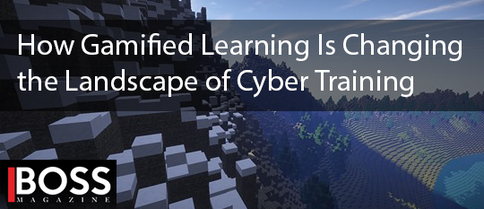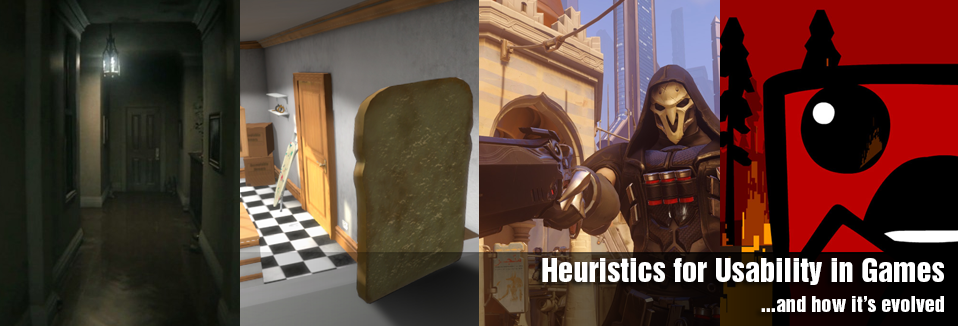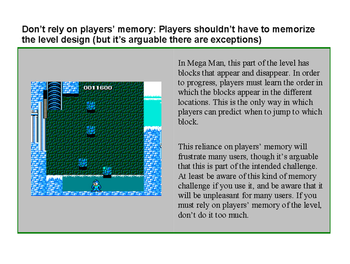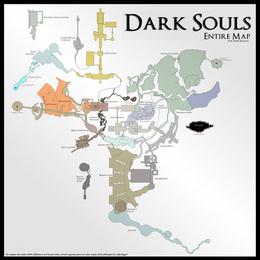|
|
Personal Projects
|
|
|
Recently I’ve been involved in some training based off of “Heuristics for usability” and “Ergonomics” while at work, and it’s really got me thinking a lot about some of the elements that I’ve already written about. When we talk about Heuristics for usability in the context of a video game, we’re talking about methodologies that we (as developers) can follow to ensure that our games are easy to read and understand. Although a lot of this can be dependent on cultural influences, for example people in North America read left to right so you might structure information this way for this intended audience. While reviewing these, I realized that I had a lot of different opinions regarding the uses of these different Heuristic rules and how they play into modern video gaming. Let me preface this by staying that this are merely my opinions, and I definitely recognize that this is heavily dependent on the type of player you might be. There have been a lot of things written about Usability Heuristics, yet for the context of this post I’ll be specifically referencing one titled “Heuristics for usability in Games” written by Noah Shaffer. I’m using his paper specifically because it does seem to cover a lot of the same topics from other sources, and in more detail. While I’ll be challenging a lot of his conclusions, I want to preface this by saying that I don’t think that he’s inaccurate but instead the industry has evolved since 2007. MemoryEarly on in this brief, Shaffer puts forth that we shouldn’t rely on player’s memory. Specifically that players shouldn’t be asked to memorize level design. I know I’ve talked a lot about DarkSouls in my previous posts, so I won’t go into too much detail… Yet I’d argue that one of the most intriguing aspects of DarkSouls 1 was memorizing the terrain, and learning how one area connected to another. Figuring out the different routes, and being able to quickly recognize where you are in the world without any type of guidance. In an earlier post I talked about playing Far Cry Primal with no hud, for me this really broadened my experience with the game. I felt less distracted by elements in the HUD and felt forced to observe the world and recognize it’s ques. Large visual landmarks that would make it easy to navigate, are ignored when we layer the screen with information that removes the player from the gameworld.
found that a lot of games have been slowly removing the mini-map from the HUD. Games like DayZ and more recently Overwatch have no mini-map, and I found quite a few threads online with gamers asking the question “Would a large open world game be possible to play without a mini map?” Which may force us, as developers, to reconsider when and where to use mini maps in our games. There are two other points that I’d like to cover in “memory” before moving on. “Don’t require the player to count resources like bullets and life” and “All relevant information should be displayed, such as life points, lives, and ammunition.” Of course this is very contextual, and depends heavily on the player and type of game. Yet when thinking about counting how many bullets you have or thinking about your “life points,” I go back to thinking about how much fun I had in Far Cry Primal with none of the above. I had to be conscious of how many spears I had left, when the screen would darken and go red I’d know that I should heal, and it really changed the dynamic from being a resource management system to one of survival. Other games like Metro 2033 bury this type of information, forcing the players to become more conscientious of their equipment. While intriguing to some players, I’m sure this also causes frustration for others. Things we can agree on.
demographic or a hard core one; without swinging hard one way or another. For example I found that the way information was fed to me in Fall Out 4, was a bit much. “Don’t bury frequently used information,” I know I said I wouldn’t talk a lot about Darksouls but I feel as though this is something they’ve worked hard on throughout the years. By modifying the control setup, and adding easier ways to access additional items, Darksouls 3 has made it easy for players to access the elements they’d like to. Games like Skyrim and Fallout, have large complicated menus that makes it clunky to access specific information. Granted this could be due to the style of game that’s being created, these being extremely content heavy, but it’s still a headache on the user. Failure Conditions
harsh but can be quite entertaining. These goals can definitely be convoluted as well… “Light these pillars,” “Kill these bosses,” or “Find pieces to a photo” are all objectives that are very obscured in these games. An odd example I have is actually from the game “I am Bread.” Ostensibly I understand that the goal of each level is to make your bread into toast and not reduce your “edibility” by dropping onto the floor. Within the first level, you’re in the kitchen and have to make your way over to a toaster across the room. In the second level, however, there is no toaster. You’re in the living room, with no visible way of toasting your piece of bread. On the ground I recognized some foot prints as being the same from the first level, and were leading out through a closed door. As a player I thought I had to actually open the door, to follow the footprints to the kitchen and find the toaster. I spent ages struggling as a piece of bread, slapping myself against the door handle… trying to get it to open. After looking online, I found that I was actually supposed to place myself on the radiator in the room to make myself into toast. Perhaps this was obvious to other players, but for me this was a massive change in player expectations… and was extremely frustrating. “Give players the feeling they can make a few mistakes by giving some room for error,” is another point that Shaffer makes and yet I feel as though many games have taken an extremely opposite position on this. Games like Super Meat Boy comes to mind, and is notorious for being very difficult and quite punishing for the player. People often ask me why I play Darksouls, and I know it’s because of it’s reputation of being hard. I think it’s heavily dependant on player expectations, and I imagine it’s the same in Super Meat Boy. As soon as you’re comfortable with death or the failed state, suddenly the game feels much less frustrating. Other players find enjoyment out of conquering something purely because of it’s difficulty and while that’s not the same feeling I have, it’s worth noting.
mechanic for health items. The “health potion” (I’m unsure of what it’s called in the game) in Nioh is quantitative, meaning that you only have a certain amount. So say you go fight a really hard boss, use up a bunch of these potions, and die… before fighting the boss again you might have to go farm other enemies to get more health items only to fight the boss again. This feels so extremely painful for a user experience, especially if you’re expecting to have hard bosses in your game. Perhaps it could be viewed as a reprieve between boss attempts, but I think it could cause a ton of frustration.
I think we’re in a common trend in the industry that is re-evaluating typical game norms and challenging them or doing them in very different ways. I wonder if, as players, we’ve become so accustomed to typical game behaviors that when these items are removed or changed… it’s now exciting or different? Earlier in gaming history developers were still figuring out many of these norms and discovering what pieces of information is best displayed for the user. So for a period of time things like the mini-map and ammo counters might have felt more novel and purposeful. Yet we’ve had these elements in gaming now for more than a decade, and we have grown so familiar with them, that players are now more open to when we change or remove them. Needlessly to say we’re still adapting as a medium and I’ll be interested to see how gaming will continue to evolve and challenge player expectations.
0 Comments
|
AuthorI make games, I play games... and sometimes I have some thoughts about that. Archives
March 2024
|
Proudly powered by Weebly
















 RSS Feed
RSS Feed